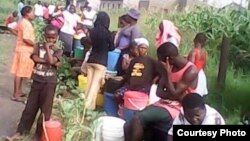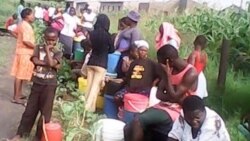The Bulawayo City Council has assured residents that it will not introduce water rationing despite fears of water shortages due to the drought brought on by the El Nino phenomenon.
Concern over the city’s water supplies was among the foremost issues raised at a meeting organised over the weekend by Bulawayo Progressive Residents Association attended by residents and council officials.
Some of the residents who attended the meeting said they wanted council to keep them informed about the water supply situation given the drought the country is facing.
Pumula South resident Dorcas Mpofu told Studio 7 that despite the fact that the country’s second biggest city is located in a more arid area than other cities, council is doing a good job in being able to provide clean water regularly.
She, however, echoed similar sentiments that council has to keep
residents abreast over measures it is taking to avert any serious water shortage.
Mayor Martin told Studio 7 that council is not going to resort to locking water taps as a measure to conserve water.
Moyo said the city’s dams are currently 44 percent full, noting that the water could last up to the next rainy season.
In previous years, council has under similar circumstances introduced water shedding for up to four days a week, but Moyo said this had created its own problems, including huge costs incurred in rehabilitating pipes that burst when water supplies are restored.
Moyo said council is embarking on a project to install a pipeline and pumps so that water can be drawn from boreholes in Epping Forest on the outskirts of the city.
The project, which the mayor said is a short-term measure to augment the city’s water supplies, is expected to be completed before year end, at a cost of about $5 million. Three million dollars has so far been raised from members of the public through levies.
Moyo also said council is rehabilitating some of the boreholes that were no longer working at the Nyamandlovu aquifer in order to help increase supplies.
He, however, urged residents to continue using water sparingly so as to ensure that supplies last longer. He noted that the city consumes up to 140 mega liters of water per month but said this should come down to about 110 mega litres.
The City of Bulawayo gets its water from Lower Ncema and Upper Ncema, Insiza, Inyankuni, Mtshabezi and Umzingwane dams. The mayor said Upper Ncema Dam has been decommissioned and Umzingwane is also set to be decommissioned soon.
Moyo revealed that individual and other ratepayers owe the council a total of $117 million, which is $4 million more than council’s 2016 budget of $113 million.
The mayor urged ratepayers to honour their obligations saying doing so would ensure that council successfully delivers the required services.
The council’s 2016 budget is yet to be approved after the Local Government Ministry referred it back to the council for conformity with regulations requiring that 70 per cent of revenue should go towards service delivery and 30 percent towards salaries.
Moyo said he was confident that the budget would be approved after council has completed the required revision.






